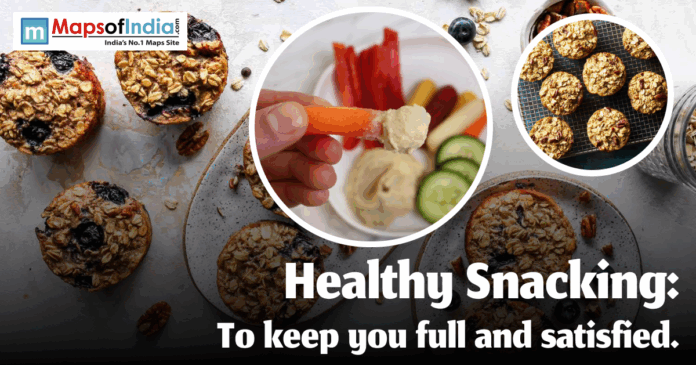Healthy snacking is a smart way to keep you full and energetic. Healthy snacking involves having nutrient-rich foods between meals. These snacks curb hunger and prevent overeating. In 2025, snacking will make up 25% of daily calories for Americans. According to the International Food Information Council survey, 50% of snacks are for nutrition. Having healthy snacks supports weight management and blood sugar stability in the human body. A recent Journal of Nutrition study found that frequent small meals reduce the risk of obesity by 20%. This practice boosts focus and mood. It provides essential vitamins and fibre. This article explores seven aspects of healthy snacking. It covers the benefits, types and tips for satisfaction.
What Is Healthy Snacking and Its Basics
Healthy snacking means eating balanced foods. These include protein fibre and healthy fats. They keep blood sugar steady. A 2025 Mayo Clinic guide says snacks should be 100-200 calories. Avoid sugary items like chips. Opt for nuts or yogurt instead. Snacking prevents energy crashes. It maintains metabolism. According to the report of the American Heart Association, having healthy snacks lowers the risk of heart disease by 15%. Basics include portion control. Use small plates while snacking to avoid overeating. The best time to snack is 3 to 4 hours after meals. Have proper intake of water before snacking, which will help you to distinguish thirst from hunger. Healthy snacking means doing mindful eating. Through this process, you mostly focus on nourishment, not calorie intake.
Benefits for Weight Management and Energy
Snacking is also helpful if you want to maintain control of your diet. It prevents binge eating at meals. According to the Obesity Reviews meta-analysis, it has been noted that snacking reduces calorie intake by 10%. Consuming nutrient-dense snacks like apples with peanut butter can satisfy your hunger. These snacks contain fibre and protein. Energy levels in the human body stay stable with the consumption of these snacks. According to a recent Journal of the American College of Nutrition study, protein snacks boost alertness by 20%. They avoid sugar crashes from processed foods. Snacking maintains muscle mass. A 2025 Nutrients journal article says frequent protein intake preserves lean body mass during weight loss. It improves metabolism by 5%. Benefits extend to mood. Stable blood sugar reduces irritability. Healthy snacking supports sustained energy.
Nutritional Advantages and Disease Prevention
Healthy snacks pack vitamins and minerals. Nuts provide omega-3s for heart health. A 2024 New England Journal of Medicine study found that daily nuts lower heart risk by 28%. Fruits offer antioxidants. Berries reduce inflammation. According to the Antioxidants journal report, consuming blueberries cuts oxidative stress by 15%. Snacks like yogurt, which contain probiotics, are helpful to improve the gut health of the human body. According to the recent Gut Microbes study, probiotics improve digestion by 20%. Consuming fibre-rich snacks is helpful in lowering the cholesterol level in the body. A 2024 Journal of Nutrition study says oats reduce LDL by 5%. Snacking on veggies boosts immunity. Carrots provide vitamin A for vision. Nutritional benefits make snacking essential. They prevent chronic diseases.
Top Healthy Snack Ideas for Satisfaction
Choose snacks that combine protein and fibre. Greek yogurt with berries is filling. Through this, you can have 20 grams of protein per cup. According to the recent Healthline article says it curbs hunger for 3 hours. Apple with almond butter offers crunch; it has 4 grams of fibre. Nuts add healthy fats. Avocado toast on whole grain is creamy. Avocados provide 10 grams of fibre per fruit. According to the Nutrition Journal study, consuming it stabilises blood sugar. Hummus with veggies is dip fun. Carrots and celery are good for vitamins. A 2023 EatingWell report says hummus has 5 grams of protein per serving. Cheese with whole-grain crackers is simple. It balances carbs and fat. These ideas keep you full.
Snacking for Different Lifestyles
Snacking adapts to needs. Athletes need protein-rich options. Nuts provide 5 grams per ounce. A 2025 Journal of the International Society of Sports Nutrition study says they aid recovery. Office workers choose portable snacks. Trail mix lasts all day. Vegans opt for chia pudding. Consuming chia seeds can give 11 grams of fibre per ounce. According to the recent Plant-Based News article, it says it sustains energy. A diabetic person should prefer low-GI foods. Cottage cheese with cucumber is ideal. A 2023 Diabetes Care journal report says it lowers blood sugar spikes by 15%. Busy parents grab fruit smoothies. Snacking supports all.
Common Mistakes and How to Avoid Them
According to the advice of a recent health article, over-snacking leads to weight gain. Limit to consuming 200 calories per day. Choosing processed foods spikes sugar. Opt for whole foods. Ignoring portions causes excess intake. Use measuring cups. A Journal of Nutrition Education and Behaviour study found portion control cuts calories by 20%. Skipping consuming protein makes having snacks unsatisfying. Add nuts or yogurt. Eating when bored confuses hunger. Drink water first. A 2023 Appetite journal report says hydration reduces false hunger by 15%. These mistakes are avoidable. Mindful choices of what you should have as snacks can give you various kinds of benefits.
Future Trends in Healthy Snacking
Snacking evolves in 2025. Plant-based options grow 20%. A 2024 Grand View Research report projects a $1.1 billion vegan snack market. Functional snacks with probiotics rise. A 2025 Food Technology magazine says gut health snacks dominate. Personalised nutrition uses AI apps. They suggest snacks based on DNA. According to the Nutrition Journal study, having proper, tailored diets helps to improve health by 30%. Sustainable packaging reduces waste. A 2023 Packaging World report says 50% snacks use recyclable materials. Superfoods like quinoa in bars. This newly developed trend mostly focuses on health and the environment.
Conclusion
Consuming healthy snacks from time to time keeps your body full and energised. This can also prevent overeating and stabilise your blood sugar level. A recent study by the Journal of Nutrition shows a 20% lower obesity risk if you consume healthy snacks. Snacks like yogurt and nuts give protein. Fruits add fibre to your diet. Adapt for lifestyles like athletes or vegans. Avoid mistakes like over-snacking. Future trends include plant-based options. The food market of healthy snacks is $3 trillion market. Healthy snacking supports the wellness of your body.





